香港朗文4A-ch3--1st
最新香港朗文4A各单元知识要点 词汇语法
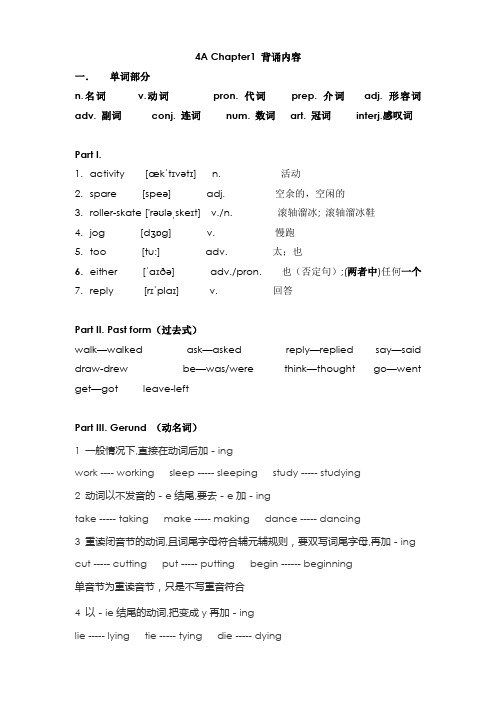
4A Chapter1 背诵内容一.单词部分n.名词v.动词pron. 代词prep. 介词adj. 形容词adv. 副词conj. 连词num. 数词art. 冠词interj.感叹词Part I.1.activity [ækˈtɪvətɪ] n. 活动2.spare [speə] adj. 空余的,空闲的3.roller-skate ['rəʊləˌskeɪt] v./n. 滚轴溜冰; 滚轴溜冰鞋4.jog [dʒɒg] v. 慢跑5.too [tu:] adv. 太;也6.either [ˈaɪðə] adv./pron. 也(否定句);(两者中)任何一个7.reply [rɪˈplaɪ] v. 回答Part II. Past form(过去式)walk—walked ask—asked reply—replied say—said draw-drew be—was/were think—thought go—went get—got leave-leftPart III. Gerund (动名词)1 一般情况下,直接在动词后加-ingwork ---- working sleep ----- sleeping study ----- studying2 动词以不发音的-e结尾,要去-e加-ingtake ----- taking make ----- making dance ----- dancing3 重读闭音节的动词,且词尾字母符合辅元辅规则,要双写词尾字母,再加-ing cut ----- cutting put ----- putting begin ------ beginning单音节为重读音节,只是不写重音符合4 以-ie结尾的动词,把变成y再加-inglie ----- lying tie ----- tying die ----- dying二.词组部分1.i n one’s spare time在某人的空余时间2.listen to (the) music 听音乐3.play chess 下棋4.like/love/enjoy doing 喜欢干某事5.go swimming (去)游泳6.go jogging (去)慢跑7.go roller-skating (去)溜冰8.be good at sth./doing 擅长于某事/干某事9.be poor at sth./doing 不擅长于某事/干某事10.be interested in sth./doing 对干某事/干某事感兴趣11.be afraid of sth./doing 害怕某事/干某事12.at/on the weekend 在周末at/on weekends13.on weekdays 在工作日14.be busy with sth. 忙于某事15.be busy doing 忙于干某事16.enjoy oneself= have a good time 某人玩得很开心17.a family helper 一位家庭帮手18.pick up kids 接小孩19.play the piano/violin 弹钢琴,拉小提琴(西洋乐器名词前加the )20.play Erhu 拉二胡(民族乐器前无the)21.play table tennis 打羽毛球(球类名词前无the)22.play on the swing/slide 在秋千(滑滑梯)上玩23.play with sb. 与某人一起玩24.play with sth. 玩耍某物25.a bit later 一会儿以后26.walk away sadly 难过地走开了27.walk the dog 溜狗28.walk home=go home on foot 走回家29.go home =go back home 回家30.after that 在那以后31.the black notes (钢琴上)黑键32.see sb. doing 看到某人在干某事33.make a new friend named Tom 交了一个叫汤姆的朋友34.in fact = actually/ˈæktʃʊəlɪ/事实上35.in the gym 在体育馆36.indoor stadium /'steɪdɪəm/ 室内体育馆37.finish sth./doing sth. 完成某事/干某事38.be important to sb. 对某人而言是重要的(绿色字体部分为拓展内容,供学有余力的小朋友默写。
朗文4AChapter3复习提要.docx
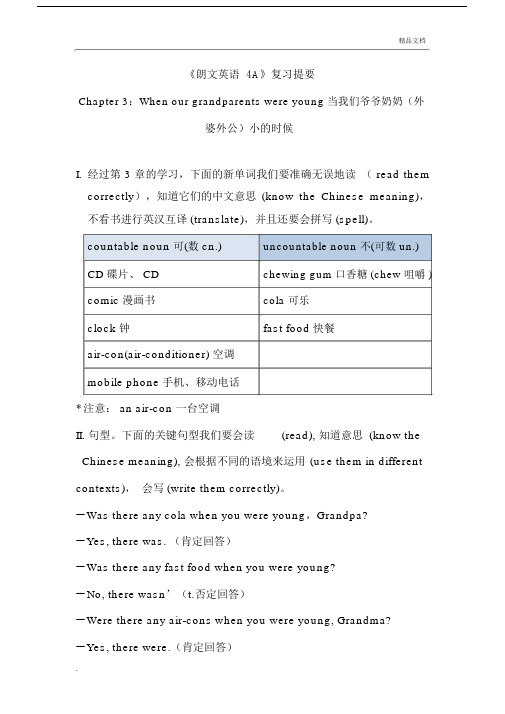
精品文档《朗文英语 4A》复习提要Chapter 3:When our grandparents were young当我们爷爷奶奶(外婆外公)小的时候I.经过第 3 章的学习,下面的新单词我们要准确无误地读( read them correctly),知道它们的中文意思(know the Chinese meaning),不看书进行英汉互译 (translate),并且还要会拼写 (spell)。
countable noun 可(数 cn.)uncountable noun 不(可数 un.) CD 碟片、 CD chewing gum口香糖 (chew咀嚼 ) comic漫画书cola 可乐clock 钟fast food快餐air-con(air-conditioner) 空调mobile phone手机、移动电话* 注意: an air-con 一台空调II. 句型。
下面的关键句型我们要会读(read), 知道意思 (know the Chinese meaning), 会根据不同的语境来运用(use them in different contexts),会写 (write them correctly)。
--Was there any cola when you were young,Grandpa?--Yes, there was. (肯定回答)--Was there any fast food when you were young?--No, there wasn’(t.否定回答)--Were there any air-cons when you were young, Grandma?--Yes, there were.(肯定回答)--Were there any mobile phones when you were young, Grandma? --No, there weren’t.(否定回答 ):当名是可数名数或不可数名,be 用数 (is,was)。
Welcome to English(WTE)香港朗文4A unit1-1优秀精选ppt精品PPT课件

这世间,有一种相逢叫做缘份。 如若有 缘,你 我会迎 着月, 奔着光 ,在人 生的某 个岔路 口相见 ,然后 又悄悄 离别。 像一朵 洁白似 雪的梨 花,轻 轻被风 吹落, 好像从 未被时 光染上 任何颜 色,永 远素雅 洁净。
有些人,在你生命里,走着走着 就散了 ,走着 走着就 远了, 转身是 刹那, 离别早 已是天 涯。有 些人, 如同在 你的世 界打马 而过, 走时如 春风拂 面,未 曾留下 一丝一 痕。有 些人, 走时却 如惊涛 骇浪, 让你痛 彻心扉 ,就像 长在你 心里的 一根刺 ,怎么 拨也拨 不出来 ,只留 下浅浅 淡淡的 伤痕, 也许, 是思念 ;也许 ,是怨 念;也许 ,只是 记得… …
make shake 元+辅+e (在开音节中元音发它在字母表中本来的音)
ate use
二、闭音节:辅+元+辅…闭音节是以一个元音字母加一个或几个辅音字母 结尾的音节(在闭音节中元音字母不发它本身的音) 重读闭音节就是最后一个音节是重读音节,当然,当某个词只有一个 音节而且末尾是辅音字母的话也是闭音节词。 如:get/get/是闭音节单词。而game/geim/却是开音节词。 begin/bi'gin/就是重读闭音节词。farmer由于重音落在 第一个音节就不是重读闭音节。
直接 +ing
listen
listening
} dance
dancing 去e
roller-skate roller-skating +ing
jog swim
jogging 双写 swimming 辅音
+ing
小知识:重读闭音节
一、开音节: 1、绝对开音节:以发音的元音字母结尾的音节。
香港朗文4A汇总U1-U7

香港朗文4A汇总U1-U7————————————————————————————————作者:————————————————————————————————日期:4A各单元总结Unit One1.重点语法和单词:Read --reading Paint--painting Dance--dancing Roller-skate—roller-skating Jog--jogging Swim--swimming Play--playing Listen--listening Walk--walking Draw--drawing Go--going2.重点句型:(1) –What do you like doing?-- I like swimming, reading and listening to music(2) I like reading too.(3) I don’t like playing table tennis either.(4) Let’s go ice-skating.3.重点词组:like doing in your spare timeplay table tennis play with sb.play on the swings play on the slideI’m busy. draw a trainwalk away walk the doglook at play the pianogo ice-skating4.动词的过去式Are--were Ask—askedSay—said Reply—repliedGet—got Walk--walkedLeave--leftGo—wentThink--thoughtUnit two1.重点语法和单词:Always Usually OftenSometimes Never2.重点句型:(1)--Do you ever tidy your room?-- Yes, I usually tidy my room.(2)—Does she ever play the violin?-- No, she never plays the violin.-- No, she doesn’t play the violin.3.重点词组:look after your pets go to bed earlytidy your room eat outget up late surf the Netget angry talk to sb.take photos invite sb. to one’s home am/is/are good at something show one aroundlook around go into the dining room enjoy the meal play a lot of musicplay the recorder play the pianoplay the violin play a lot of sportplay pingpong play table tennisplay football watch football matches4.动词的过去式say—said talk—talkedcan—could ask--askedthink—thought show--showedhave—had call—calledwill--would enjoy--enjoyedspill—spilled/spilttake--tookgo--wentUnit Three1.重点语法:am/is/are--was are--were ask--asked like--likedfly--flew make--made flick--flicked want--wanted catch--caught draw—drew stay--stayed happen--happened put--put say--said Play--playedhave/has--had hit--hitkeep--kept go--wentlose--lost do--didwin--won2.重点单词和词组:cola fast food CDscomics clocks air-consmobile-phones rickshaw an oil lampclogs camera fanstove play computer games fly kitesplay hopscotch make nets catch butterflies play marbles draw a circle on the groundgo out of the circle want to +动词原形flick the shooter into thecirclego out a lot of credit cardswear trainers have telephones check your answer ask someone3.重点句型:(1)--Was there any cola when you were young?-Yes, there was.(2)The game I like best was marbles.(3)How do you play marbles?(4)– Did you wear trainers fifty years ago?--Yes, I did.(5)—Did you have a telephone?-- No, I didn’t. Rich people had telephones at home but poor people didn’t.(6 ) – Did you shop at the supermarket?--- No, I didn’t. There weren’t any supermarkets.(7) – Did you go to school?-- No, I didn’t. Rich children go to school but poor children didn’t.(8) –Did you listen to the radio?-- Yes, I did.Where(哪里)do you like going to in your holiday?How(如何)do you help at home?How much (多少钱,提问不可数名词)is it? --- It is five dollars. How many (多少,提问可数名词)books in your home?What time(什么时间)is it?What(什么)are you doing now? ----I am doing my homework. What(什么)is the weather like today? ----It’s windy.What color (什么颜色)is it? ---- It is red.What (什么)are you? ( What do you do?) -----I am a driver.When(什么时候)is your birthday? ---on 2nd MayHow old(多大)are you? ----I am ten.Who (谁) are you? -----I am David.Which(哪一个) club do you want to join?Why(为什么)do you like playing football?----Because I like being healthy.Unit Four1.重点单词和词组:cotton clothes silk clothes a horse a sedan chair silver and gold paper money a village a town do one’s homework feel sleepy after a while fall asleep strange friendly missWhy don’t you post office explain suddenly wake up Chinese Newcelebrate cook with firewood Ride horses Travel by sedan chair YearTravel by boat Send letters Rich people supermarket Cook with gasLook tired This is fun Live in flats Keep in touch with Be away fromhome2.动词过去式:wear—wore ride—rode travel—travelled walk—walked feel—felt take—took miss—missed write—wrote explain—explained wake—woke 3.重点句型(1)How did people travel?——Most/Rich/Some people travelled by boat/sedan chair.(2)What did people wear?——Most/Rich people wore cotton clothes/silk clothes.(3)May I use your phone?(4)Why don’t you+动词原形(5)How do you want to send your letter?——By...... .(6)Were there any supermarkets?——No,there weren’t.Unit Five:1.重点单词词组science museum a horse a camel a giraffe an owla peacock an eagle a hippo leader come forwardwise look after talk about eel shark dolphin starfish crab come down break direction scary feather noisy hairytiny wolf crocodile penguin parrotbee fly cockroach shiny silver2.单词过去式meet—met come—came say—said speak—spoke catch—caught swim—swam shout—shouted break—broke save—saved3.形容词比较级最高级Tall-taller-tallest Heavy-heavier-Big-bigger-biggest Small-smaller-smallest Pretty-prettier-prettiest heaviestGood-better-best Long-longer-longestFast-faster-fastest Strong-stronger-strongest4.重点句型(1)The horse, the camel and the giraffe are tall.The camel is taller than the horse.The giraffe is the tallest.(2)I’m stronger than all of you.Unit Six:1.重点单词和词组villages islands temples crocodiles snakesa boat trip a camel trip a helicopter trip a waterfall a rivera cave at the beach proud powerful show offshow sb around country politely an hour a thick jungle different plant huge later fly overmountain dangerous fantastic too tired at the beginningof restaurant activity enjoyable exciting wonderful2.形容词比较级最高级interesting-more interesting-the most interesting exciting-more exciting-themost excitingpowerful-more powerful-themost powerfulbeautiful-more beautiful-the most beautifuldangerous-more dangerous-the most dangeroushigh-higher-highest nice-nicer-nicest wide-wider-widest light-lighter-lightest3.重点句型(1)We visited some interesting places.The villages were more interesting than the temples.The islands were the most interesting.(2)Let me show you around my country.Let sb +do(动词原形)(3)Isn’t it big?——Yes, it’s huge.(4)Are we near your home yet?——Oh,no.It’s still a long way away.Unit Seven1.单词词组汇总learn a lesson character list forest insect busyquickly slowly work hard collect build a newhomebright light up path naughty loudly softly match carefully careless Don’t worry drop burn down be afraid of warn Look out get away speak angrily steal dirty rubbish bin clean up stranger fly off2.过去式light—lighted(lit) drop—dropped burn—burnedsteal—stole fly—flew happen—happened start—started try—tried get—got3.重点句型(1)The insects are busy today,aren’t they?——Yes,they are.(2)What are they?——They are......(3)Did you steal the matches?——Yes,I did.(4)Why did you fly off with the burning match?——Because I.......。
香港朗文4A单词及句子
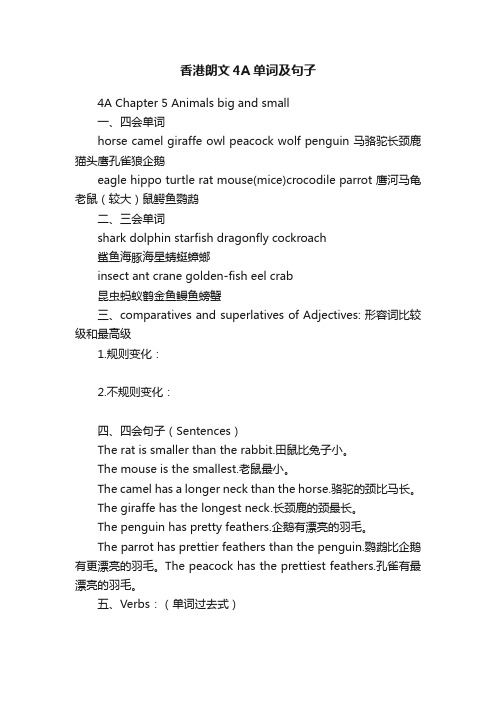
香港朗文4A单词及句子4A Chapter 5 Animals big and small一、四会单词horse camel giraffe owl peacock wolf penguin 马骆驼长颈鹿猫头鹰孔雀狼企鹅eagle hippo turtle rat mouse(mice)crocodile parrot 鹰河马龟老鼠(较大)鼠鳄鱼鹦鹉二、三会单词shark dolphin starfish dragonfly cockroach鲨鱼海豚海星蜻蜓蟑螂insect ant crane golden-fish eel crab昆虫蚂蚁鹤金鱼鳗鱼螃蟹三、comparatives and superlatives of Adjectives: 形容词比较级和最高级1.规则变化:2.不规则变化:四、四会句子(Sentences)The rat is smaller than the rabbit.田鼠比兔子小。
The mouse is the smallest.老鼠最小。
The camel has a longer neck than the horse.骆驼的颈比马长。
The giraffe has the longest neck.长颈鹿的颈最长。
The penguin has pretty feathers.企鹅有漂亮的羽毛。
The parrot has prettier feathers than the penguin.鹦鹉比企鹅有更漂亮的羽毛。
The peacock has the prettiest feathers.孔雀有最漂亮的羽毛。
五、Verbs:(单词过去式)meet-met speak-spoke come-came swim-swam遇见讲话到来游泳break-broke save-saved choose-chose catch-caught 打破解救选择抓住become-became成为毛。
(完整版)香港朗文英语4A试卷

(完整版)香港朗文英语4A试卷Longman Welcome to English4A Final ExaminationPart II Reading and writing (读写部分)75%I. Read and copy (读一读,正确抄写下列句子, 注意大小写及标点符号)5*1%were there any cola lucy no there weren ’t________________________________________________________________ II. Fill in the blanks. (写出发音不同的单词) 1*5% 1. We l oo k at the b oo ks in the aftern oo n.2 The br ea d on the t ea cher’s sketch-book is cl ea n. 3.Hei s s itting in hi s living room. 4.A d eer is n ear a ch air under the tree. 5. Th ese th ree boys are th irsty.II. Fill in the blanks. (找出不同类的单词) 1*5%1. A. wore B. put C. read D.hit2. A. slow B. quickly C. fast D.lovely3. A. my B.your C. her D. it4. A. kites B. fly C. plays D. reads5. A. the B. an C. or D. aIII. Fill in the blanks. (用所给单词的适当形式填空) 1*5% 1. Yesterday (be) a holiday.2. Last Sunday Mr. Chou (wear) a new T-shirt.3. We (fly) kites at the beach now4. (be) there any telephones fifty years ago ?5. The summer holiday is coming. My mum (buy) an air-cons..IV. Choose the correct answers (读一读,选择正确的答案)1*15% ( ) 1. John and Jesse drinking 班级姓名学号……………………………………………………………………装订线…………………………………………………………A. are like doingB. likes doingC. like doing( ) 3. Jack listens everyday.A. radioB. to radioC. radios( ) 4. Did he a telephone fifty years ago ?A. hasB. hadC. have( ) 5. He often on Sundays.A. rides a horseB. rode a horseC. will( ) 6. I don’t like go dancing, Jim doesn’t like it .A. tooB. eitherC. both( ) 7. Penny is best friend .I write a letter to every weekA. I, herB. my, herC. my, she( ) 8. he go last year? He went to the USA.A. What didB.? When doC. Where did( ) 9. the child playing football ?A. Do, likesB. Does, likeC. Does, likes( ) 10. This butterfly likes , , and readingA. danceing,running,flingB. dancing,runing,flyingC. dancing,runing,flyingD. dancing,running,flying( ) 11. Mary likes playing _____ piano.A. theB. /C. a( ) 12. ____ there any cameras when your grandpa was young?A. WereB. WasC. IsD. are( ) 13. What ____ Tina _____ doing in her spare time?A. is; likeB. does; like( ) 14. His grandma _____ mobile phone forty years ago.A. didn’t useB. wasn’t use( ) 15. Jack ____ to school on foot yesterday morning.A. goesB. wentC. goD. goneV. Read and write (根据要求写句子)2*5%1. Billy likes roller-skating. (改成否定句)_______________________________________________________________ 2. Is there any cola when you are young ? (将句子改为过去时)_______________________________________________________________ 3. Does she ever play the recorder? (肯定回答)_______________________________________________________________ 4. don ’t a lot music I either like playing of (连词成句)_______________________________________________________________ 5. I like reading..(根据答句,写出相应问句)_______________________________________________________________ VI. Read and write (完形填空)1*10%.Last Sunday 1 a rainy day. My aunt 2 to my home. She 3 her raincoat and 4 , you 5 6 at home, it 7 raining hard outside. I 7 the window. It really was. So I 9 TV inside. I am interested in a fli m.10 film is Harry Potter .( ) 1. A. is B. are C. was D. were ( ) 2. A. come B. goes C. comes D. came ( ) 3. A. put on B. took away C. bring D. took off ( ) 4 A. say B. said C. says D. didn’t say ( ) 5. A. should B. may C. shouldn’t D. would better ( ) 6. A. stay B. be C. stayed D. were ( ) 7. A. is B. was C. am going to D. be( ) 8 A.look out of B. look at C. has a look at D. looked out of ( ) 9 A. see B. saw C. watched D. watch ( ) 10 A. a B. the C. A D.The VI. Read and write (阅读短文,回答问题)2*5%.Joan got home late from work today, and she was very happy. When she opened the refrigerator, she was upset. There was nothing to eat for dinner. Joan sat down and made a shopping list. She needed a head of lettuce, a bunch of carrot, a quart of milk, a dozen eggs, two pounds of tomatoes, half a pound of chicken, and a loaf of bread. Jone ran out of the house and drove to the supermarket.When she got there, she was very unhappy . There weren’t any carrots. Ther e wa sn’t any milk. There weren ’t any tomatoes. Joan was tired and upset. She lost姓名学号……………………装订线…………………………………………………………her appetite(食欲,胃口),drove hom e, didn’t have dinner, and went to bed. ( )1.Was there anything to eat in the refrigerator?A. Yes, there was.B. No, there wasn’t.( )2.Did Joan need any fish?A.Yes, she did.B. No, she didn’t.( )3. How did Joan go to the supermarket?A. By car..B. On foot.( )4.Joan bought _____________ in the supermarket.A. nothingB. milk( )5.What did Joan do after she drove home from supermarket?A. She went to bed.B. She ate dinner.VIII. Composition. (作文) 10%以一般过去时,描写在家的一天,介绍自己或家人做过的事情,不少于8句话.。
Welcome to English(WTE)香港朗文4A unit1-1课件
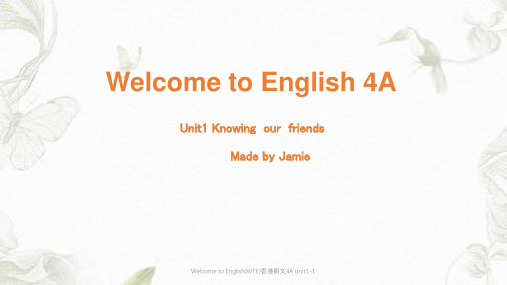
danceing.
Welcome to English(WTE)香港朗文4A unit1-1
like doing like to do ?
like doing sth表示一种长期的习惯 和爱好,以前就喜欢,还可能持续
like to do 是表示偶然的一次或者几次、想 要去做某事
Welcome to English 4A
Unit1 Knowing our friends Made by Jamie
Welcome to English(WTE)香港朗文4A unit1-1
Part a
Welcome to English(WTE)香港朗文4A unit1-1
Unit1 Knowing our friends
+5
Welcome to English(WTE)香港朗文4A unit1-1
+5
What do you like doing in your spare time? I like playing the piano, swimming and watching TV.
Welcome to English(WTE)香港朗文4A unit1-1
ate use
二、闭音节:辅+元+辅…闭音节是以一个元音字母加一个或几个辅音字母 结尾的音节(在闭音节中元音字母不发它本身的音) 重读闭音节就是最后一个音节是重读音节,当然,当某个词只有一个 音节而且末尾是辅音字母的话也是闭音节词。 如:get/get/是闭音节单词。而game/geim/却是开音节词。 begin/bi'gin/就是重读闭音节词。farmer由于重音落在 第一个音节就不是重读闭音节。
香港朗文4A Unit 1-2 综合习题(2)

Unit 1-2 综合习题一.翻译词组打乒乓球__________________________踢足球__________________________做运动__________________________弹钢琴__________________________拉小提琴__________________________玩音乐__________________________上网__________________________照顾宠物__________________________外出吃饭__________________________听音乐__________________________整理房间__________________________下象棋__________________________二.据要求写句子。
1. Billy likes roller-skating. (改成否定句)______________________________________________________________2. 空闲时间你喜欢做什么? (将句子翻译成英语)___________________________________________________________3. Does she ever play the recorder? (否定回答)_____________________________________________________________4. don’t ,I ,either ,like ,listening to music(连词成句)_____________________________________________________________5. 我也不喜欢踢足球.(翻译成英语)______________________________________________________________三.看图完成下列句子提示词:do does everA: Do you ever get up late?B: _______, I never get up late.A: _________ Ben ________ play table tennis?B: _______, he __________ plays table tennis.四.选词填空dance paint jog read swim roller-skate(1)I like reading.(2)I like __________. (3) I like ____________.(4)I like __________. (5) I like __________. (6) I like _____________.五.看表格选词填空(sometimes, always, never, usually, often)1.Grandpa _____________________ plays the piano.2.Mum _______________ cooks for our family.3.David ______________ looks after the cat.4.Grandma _______________ surfs the Net.5.Dad _________________ gets up late.SUN MON TUE WEN THU FRI SATGrandpa√√√√Mum√√√√√√David√√√√√√√Grandma√√DadA: _________ you ________ go to bed early?B: _______, I ________ go to bed early.A: _______ you _______ play football?B: _______, I ________ ________ _____________.A: _______ Peter ever ___________________?B: _______, he __________________________.A: ___________________________________?B: ___________________________________.。
Welcome to English(WTE)香港朗文4A unit1-1优秀精选课件
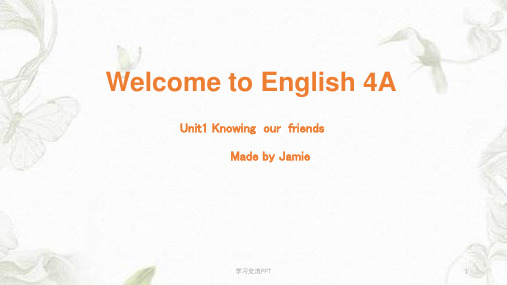
like doing sth表示一种长期的习惯 和爱好,以前就喜欢,还可能持续
like to do 是表示偶然的一次或者几次、想 要去做某事
学习交流PPT
18
verbC “ ing” form
} read
paint play
reading painting playing
直接 +ing
listen
6
Activities in spare time
学习交流PPT
7
read
学习交流PPT
8
paint
学习交流PPT
9
dance
学习交流PPT
10
roller-skate
学习交流PPT
11
jog /dʒɒg/慢跑
学习交流PPT
12
swim
学习交流PPT
13
play chess/tʃes/国际象棋
1. too用于肯定句句末,其前加逗号时,表示“也、还”之意。 例如:I know the answer, too.我也知道这个答案。
2. too修饰形容词或副词,作程度状语时,表示“太、过份”之意。 例如:He speaks too fast. 他讲话太快。
3. too也可用在口语中,表示“真是、很、非常(= very)”之意。 例如:I’m too happy. 我非常幸福
Welcome to English 4A
Unit1 Knowing our friends Made by Jamie
学习交流PPT
1
Part a
学习交流PPT
2
Unit1 Knowing our friends
know: v.知道; 了解; 认识; 确信 了解我们的朋友
香港朗文版4A-Chapter4-Five-hundred-years-ago

22 rice and meat
Were there any tunnels 500 years ago?
a tunnel
a rope bridge
23
Were there any long bridges
500 years ago?
long bridge
short bridge
24
大部分人: most people 一些人: Some people 少部分人: a few people 几乎没人: few people 没人: no people no one
ed-id
need-needed
ed-id
ed的三种发音: 清读清(t), 浊读浊(d) t,d 结尾读 id
30
No, there weren’t.
How was life 500 years ago? Were there any supermarkets?
31
No, they didn’t.
Five hundred years ago
1
About 500 years ago the year 1513 Ming dynasty
Zhu yuan zhang
The emperor of Ming dynasty
2
People
• 士 scholar • 农 farmer • 工 worker • 商 businessman
25
Part E
26
27
People didn't .... There was/ were... There wasn't/ weren't...
28
词尾-ed 的发音 ask-asked bake-baked cook-cooked drop-dropped finish-finished help-helped like-liked look-looked surf-surfed
(2021年整理)香港朗文英语4a语法综合复习3
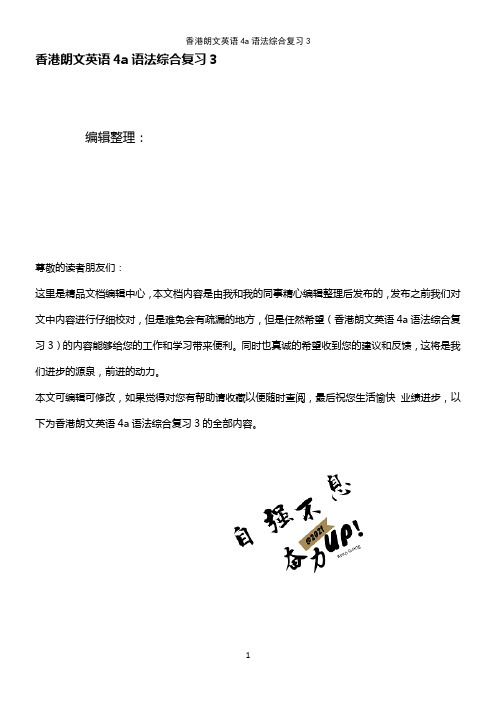
香港朗文英语4a语法综合复习3编辑整理:尊敬的读者朋友们:这里是精品文档编辑中心,本文档内容是由我和我的同事精心编辑整理后发布的,发布之前我们对文中内容进行仔细校对,但是难免会有疏漏的地方,但是任然希望(香港朗文英语4a语法综合复习3)的内容能够给您的工作和学习带来便利。
同时也真诚的希望收到您的建议和反馈,这将是我们进步的源泉,前进的动力。
本文可编辑可修改,如果觉得对您有帮助请收藏以便随时查阅,最后祝您生活愉快业绩进步,以下为香港朗文英语4a语法综合复习3的全部内容。
综合复习3(第三人称单数以及其他时态)一.写出下列动词的第三人称单数。
drink __________go ____________stay __________make __________look __________have _________ pass __________carry __________come ___________watch __________plant _________fly ________study ________brush _________do ___________teach____________take__________ see__________二。
写出下列动词的现在分词。
put __________give __________fly _________get ________dance ____sit_________ run ________ plant _________take ___________swim _________ask ___________stop __________take _________ write __________have __________smoke _________think__________ want__________ tell__________三。
